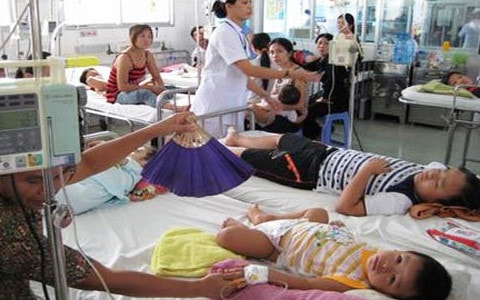How to prevent summer diseases for children that parents should know
In hot weather, children often get diseases such as rhinopharyngitis, pneumonia, bronchitis, diarrhea, rash fever, measles, chickenpox, Japanese encephalitis...
According to Dr. Nguyen Trong Thong, former Head of the Department of Pharmacology, Hanoi Medical University: Hot summer weather, especially high humidity in the air, causes bacteria such as E.coli, Shigella, Salmonella, some viruses or some disease-carrying agents such as mosquitoes to thrive.
Hot weather, using fans a lot, and turning on air conditioners at low temperatures makes the air dry, the mucous membranes of the throat and nose dry, reducing the mucus that protects against bacteria, creating conditions for bacteria to grow. The most common diseases caused by this cause are respiratory diseases: rhinopharyngitis, pneumonia, bronchitis, etc. In particular, children with a history of bronchial asthma are very susceptible to relapse under these conditions.
 |
| How to prevent summer diseases for children that parents should know (Photo for illustration purposes only) |
Hot weather also creates favorable conditions for some types of viruses and mosquitoes to develop, so children are often bitten by mosquitoes and can contract diseases caused by viruses such as dengue fever, Japanese encephalitis, hand, foot and mouth disease...
In addition, hot weather and high environmental temperatures often cause children to have prickly heat, which causes itching and discomfort, or children can get heatstroke if they play in the hot sun for too long, because their bodies lose a lot of water and minerals through sweat secretion on the skin, through breathing...
Here are ways to prevent some typical diseases in the summer:
Diarrhea:It is a condition of having loose, watery stools more than 3 times a day. Diarrhea lasting less than 14 days is called acute diarrhea and 14 days or more is called persistent diarrhea. Diarrhea in children can be caused by bacteria or viruses.
To prevent diarrhea, infants need to be exclusively breastfed until 4-6 months old, and only given solid food after 4-6 months old if the mother has enough milk. It is necessary to maintain adequate nutritional components in the child's diet such as: glucid, protein, lipid, vitamins and minerals. It is necessary to preserve and prepare food properly, suitable for the child's taste, and ensure hygiene. Use clean water and covered water containers. Domestic water must be far from animal pens, latrines, and sewers; avoid using contaminated water. Drinking water must be boiled; containers must have lids; cups, bowls, and spoons must be washed and dried.
All family members must wash their hands before eating, wash their hands with soap after using the toilet or cleaning and washing children's feces. Wash hands before preparing food for children. Use hygienic latrines. Dispose of feces, water and waste safely; away from water sources. Fully vaccinate children according to the recommendations of the expanded immunization program.
Viral diseases:There are currently more than 200 strains of viruses isolated, but most of them are common viruses that are not harmful to children. The disease can heal itself in 5-7 days if monitored and cared for well. However, there are some viruses that cause dangerous diseases for children such as measles, rubella, Japanese encephalitis, dengue fever...
Roseola (caused by a virus):Usually, children have a high fever of 39-40ºC, loss of appetite, fussiness, lethargy, and even convulsions. In addition, children also have signs of cough and runny nose. When a rash appears on the body, the child's fever will decrease. For children with a rash without a high fever, the disease will be detected later, so parents need to pay attention and not be subjective to avoid complications caused by the disease.
To prevent rash fever, it is necessary to clean the child, drop eye and nose drops with solution to prevent infection. Give the child a nutritious diet to increase resistance. Children should drink plenty of water, eat fruits rich in vitamin C, drink fruit juices... Limit contact with sick people because this is a very contagious disease. When the child has a high fever, take the child to a medical center for examination and timely treatment. In particular, if the child has rash fever accompanied by symptoms of headache, vomiting, convulsions... take the child to a medical facility for examination and timely treatment.
Japanese encephalitis B: Is an acute infectious disease of the central nervous system caused by a virus of the Arbovirus group. The virus is transmitted to healthy people through the bite of Culex mosquitoes. The disease usually occurs in the summer, commonly from May to July. The disease can develop into an epidemic.
Japanese encephalitis B is a dangerous disease but can be actively prevented by injecting the Japanese encephalitis B vaccine correctly and completely. The Japanese encephalitis B vaccine is recommended for children 12 months of age and older, with the second dose given 1 week after the first dose and the third dose given one year later. A booster shot can be given every 3-4 years until 15 years of age.
Besides, proactively preventing mosquito bites such as killing mosquitoes, sleeping under mosquito nets... are positive measures to prevent the disease./.
According to VOV
| RELATED NEWS |
|---|

